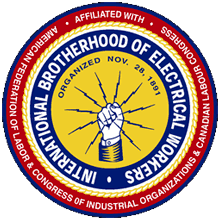By Joe Maniscalco
June 22, 2015
New York, NY – At first glance, the parallels between building construction and story structure might not seem all that apparent — but for LaborPress’ own Bill Hohlfeld, there is something special about dropping steel columns and penning powerful prose that makes the two disciplines a lot alike. And the former ironworker and “Ascent to Avalon” author ought to know, because he’s done both.
“When I worked on high-rises in Midtown we did it on a two day cycle,” Hohlfeld says. “There was a rhythm to it. You did your bottom steel, you did your top steel, you dropped your columns — there was a sequence — and every couple of days you looked at it. And every two days it was another floor. Even though the entire project wasn’t yet completed, that particular piece was completed, so there was a constant feeling of accomplishment going on.”
Hohlfeld took that same experience in the Building Trades — some 20 years as a “rebar man” with Local 46 — and  used it to propel him though his Raymond Chandler-esque mystery about a construction worker turned private eye who is implicated in the murder of his very first client.
used it to propel him though his Raymond Chandler-esque mystery about a construction worker turned private eye who is implicated in the murder of his very first client.
“Each chapter would have its own sequence, and at the end of each chapter, I would get that same feeling of accomplishment — not one of the final project — but one that said I got another component completed, and I could go home feeling good,” the Rockland County resident says.
These days, Hohlfeld is heading up LaborPress’ new Internal Communications Division, but 30 years ago, he was a 32-year-old apprentice, formerly reared on the streets of Yorkville on the Upper East Side, when the area was still a mostly German enclave comprised of blue collar walkups and hardworking immigrant families.
“Growing up like I did, getting into the Building Trades was the big thing,” Hohlfeld says. “You knew you weren’t going to college, the Building Trades was the best that you were going to do. I knew how hard it was to make it, so I was really aware that this was a wonderful opportunity.”
Hohlfeld’s life became so enmeshed in the Building Trades, that he decided that he would, in fact, go to college after all, and earn an undergraduate degree in Labor Studies.
“I was really intent on educating myself about the Labor Movement,” the father of two says.
At the same time, Hohlfeld also knew that he enjoyed writing — quite a lot. When he wasn’t bending rebar, he often found himself writing poems, composing short stories and filling up a box of rejection slips. At least one of those rejection slips came courtesy of the New York Times’ "About Men" section.
Hohlfeld’s passion for prose ultimately led him to Lehman College where he worked hard and earned a master’s degree in English Composition. While there, he also encountered Raymond Chandler’s essay “Down These Mean Streets" for the first time.
Already a big fan of film noir and hard-boiled detective fiction, Hohlfeld had always considered the genre’s two-fisted, trench coat-wearing private eyes to be a lot like 20th century knights on a quest.
Chandler’s take on the same Arthurian premise “completely validated” the aspiring writer’s opinion, and set him on a literary course that would become largely informed by Hohlfeld's earlier exploits as an ironworker.
“[Detective fiction] has that snappy patter and very quick repartee that goes back and forth between characters,” Hohlfeld says. “It’s shoot from the hip. And that's the kind of dialogue that I heard around me all my life in the workplace. There's a very particular type of working class intelligence there — it's a working-class wittiness.”
Hohlfeld’s steel-forged work ethic also helped provide him with the kind of discipline a fledgling author needs to devote a minimum of 15 minutes a day to writing.
“No matter what — cold flu, tired wet hungry, whatever — there is no one on the face of this planet that is too overburdened or too busy to spend at least 15 minutes, and I stuck to that,” he says.
Like all those Midtown buildings he helped erect, the sweat that Hohlfeld poured into writing “Ascent To Avalon” — under his “Dennis Patrick” nome de plume — was challenging, but also deeply fulfilling.
“It's certainly not the grandest work I could point to, but I love it because of its detail and the distinct lines that it has,” the author says. “It's architecturally sound.”
“Assent To Avalon” is available for Kindle and order at Amazon.com. For more information about the book and the author, visit http://dennispatrick.webs.com.



